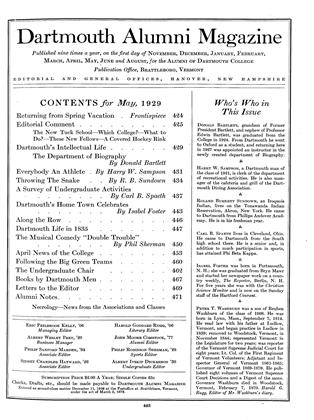The Hanoverian undergraduate, emerging exultantly from the March doldrums, flitted through the Easter interlude and returned for the annual spring thrill of discovering a transformed Hanover. April seemed to be satisfactorily installed. The campus could hardly be said to be green, but there were signs of verdure and things generally looked hopeful. The sun was shining, and spring moods were in the air. But this springtime morale took an awful jolt when the College awoke on April 12 to find itself in the midst of a snowstorm. Before it was all over, several days later, there was a foot of snow on the ground, slush was once more a depressing factor in one's class-to-class existence, and the campus had relapsed into a March mood. Things looked pretty dark. It is somewhat surprising that no one disappeared: we seem to be somewhat behind our spring quota of disappearances.
The snowstorm which started early Friday morning and continued until Saturday noon, sweeping parts of New Hampshire, Vermont and Maine, was one of the heaviest in several years, and created an all-time record for April. Depth of 14 inches was reported in some localities, but Professor Poor's measurements at the observatory showed the Hanover, fall to be 11 1/2 inches.
April finally reasserted itself, spirits revived, and the undergraduate settled down to the big play-period of the Hanover year, when the outdoors calls for the afternoons, the peerade havens cry most imperatively for the week-ends, and life is altogether too charming to be taken very seriously. April, when it is really April, is a good month. We suppose it was much the same in the Rum Era.
One big Fact that hovers seriously over seniors' minds, however, is the forthcoming comprehensive examinations. Whenever a group of cane-carvers get together, the subject comes up and there is much vocal worrying done. So far, however, we haven't seen anyone who is doing anything about it. The general feeling seems to be that, if there is anything that should be done, it is too late to do it now. And then there is that characteristic comfortable assurance that everyone is in the same situation, and as long as we stay in the shadow of that Comfortable Average, we are all right.
But in May the comprehensives will vie with House Party as the big news.
The big news of this month was, of course, vacation. The fashionable place was Bermuda, the average place was home, and every place had its moments. The same old sagas came back all dressed up in new trimmings.
The breaking of the news about the new Tuck School buildings, soon after return, aroused quite a flurry of interest. The announcement of large gifts and impressive building projects is no longer a new thing, but, contrary to allegations sometimes made, the student body does not receive these flippantly as a matter of course. On the contrary, the undergraduate takes rather a naive pride in showing off new buildings. And the announcements of gifts, although not greeted with wah-hoo-wahs, are read with a sincere interest and appreciation and are talked about as long as anything is talked about in Hanover, excepting the weather. This announcement in particular received much general campus attention, due to an interest in the new developments along Tuck Mall, in the Harvard housing experiment, and in anything bearing even remotely upon the Hanover food problem. Dartmouth is weary of being notorious for bad food, and by April is rather weary of the bad food itself, so that the dormitory refectory had its appeal as a possible new departure bringing improvement to this situation.
The Dartmouth commented editorially as follows:
"Tuck School is moving off campus, bag and baggage. Down by the Mall the College is going to build a new recitation building, a new dormitory for Tuck School men, and, most startling, a new dining hall. The whole will be a compact enclosure—a new departure in Dartmouth educational method.
"The significance of the gift entails a great deal more than the mere laying of a few million bricks. It will free Tuck School from the inertia of the undergraduate mind. More important, it will mean freedom for the Department of Economics from the physical overlordship of Tuck School. The Dartmouth ideal has always been the college ideal, as opposed to that of the university. The physical presence of Tuck School in the center of the undergraduate plant and the forced interrelation of Tuck School and the undergraduate curriculum have hitherto been one of the larger flies in this ointment.
"There is no means of estimating the value to future American business of an incubator that controls every variable but the individual personality."
 View Full Issue
View Full Issue
More From This Issue
-
 Article
ArticleA Survey of Undergraduate Activities
May 1929 By Carl B. Spaeth -
 Class Notes
Class NotesClass of 1898
May 1929 By H. Phillip Patey -
 Lettter from the Editor
Lettter from the EditorFor opinions which appear in these columns the Editors alone are responsible
May 1929 -
 Class Notes
Class NotesClass of 1923
May 1929 By Truman T. Metzel -
 Article
ArticleDartmouth Life in 1835
May 1929 -
 Class Notes
Class NotesClass of 1910
May 1929 By Arthur P. Allen
Albert I. Dickerson
-
 Article
ArticleOn the Hanover Stage
May 1929 By Albert I. Dickerson -
 Article
ArticleThe Musical Clubs Trip
May 1929 By Albert I. Dickerson -
 Article
ArticleIn the Tower Room
June 1929 By Albert I. Dickerson -
 Class Notes
Class NotesClass of 1930
December 1932 By Albert I. Dickerson -
 Class Notes
Class NotesClass of 1930
February 1934 By Albert I. Dickerson -
 Class Notes
Class Notes1930*
December 1938 By ALBERT I. DICKERSON







